Hey there! This post contains affiliate links. Using my links means I earn a commission, which helps me create more rad content. More on affiliates here.
I first started working social media marketing around 2010. I was taking time off from school (figuring out my ADHD and, you know, coming out). I was CONVINCED that there had to be a way to work remotely and make money, and this was before the whole “digital nomad” movement took off.
While working at a flower stand selling potted arrangements (I’m a plant nerd, it’s true!), I used the company’s iPad to start filling out applications on what was then oDesk, and is now UpWork, a website designed to help people find remote work online.
[Heads up! This post uses affiliate links, and you help me earn $$ when you use my links. More on affiliate links here!]
I’ve Made a LOT of Mistakes with Proposals
After nearly 10 years in the biz, I designed a course, “Freelance Social Media Bootcamp,” a 2-week course designed to take everything I’ve learned about social media marketing, testing and getting clients – and delivering it to my students! You can check out the course here.

Today, I wanted to give you all a “sneak peek” to that course, and share 7 things I make sure to include in my freelance social media contracts with potential clients. There’s way more to pitching and negotiating than I can fit in this post, but let’s get started:
NOTE: I AM NOT A LAWYER. THIS INFORMATION IS MEANT FOR EDUCATIONAL PURPOSES. IF YOU’RE TRYING TO CYA IN CONTRACTS AND PROPOSALS, GET A LAWYER TO REVIEW IT.
Freelance Social Media Contract Tip #1: Define the Difference Between a Contractor and an Employee
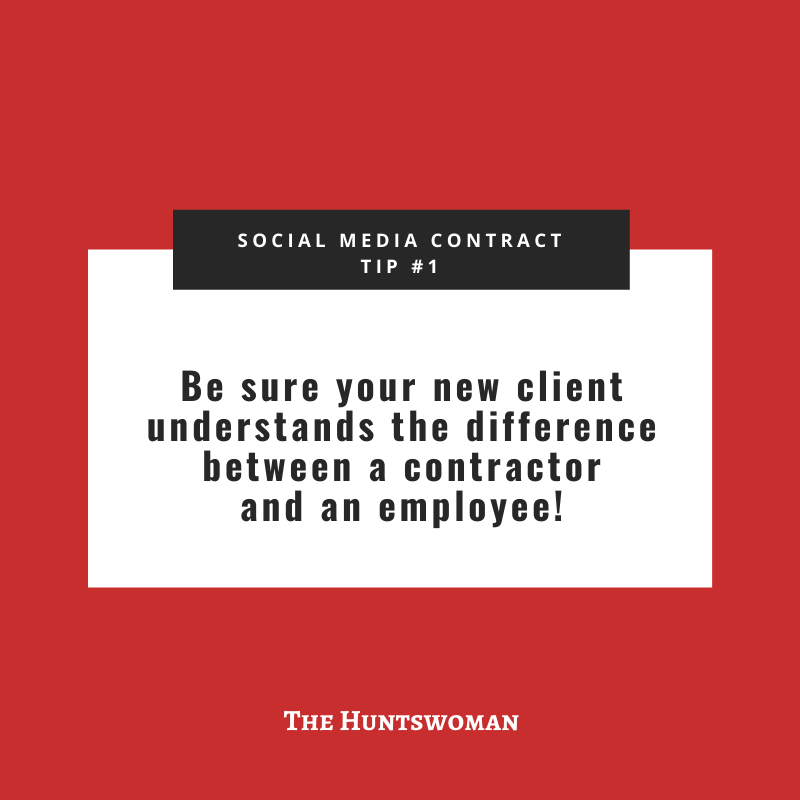
In my experience, i’ve found that some clients don’t understand the real legal difference between a 1099 contractor (freelancer) and employee. Some clients hire me for say, 10 hours a week, and expect me to be available for 40.
I’ve had clients request that I do something, and then expect that I will IMMEDIATELY go and do it. It’s not their fault – they don’t understand the difference.
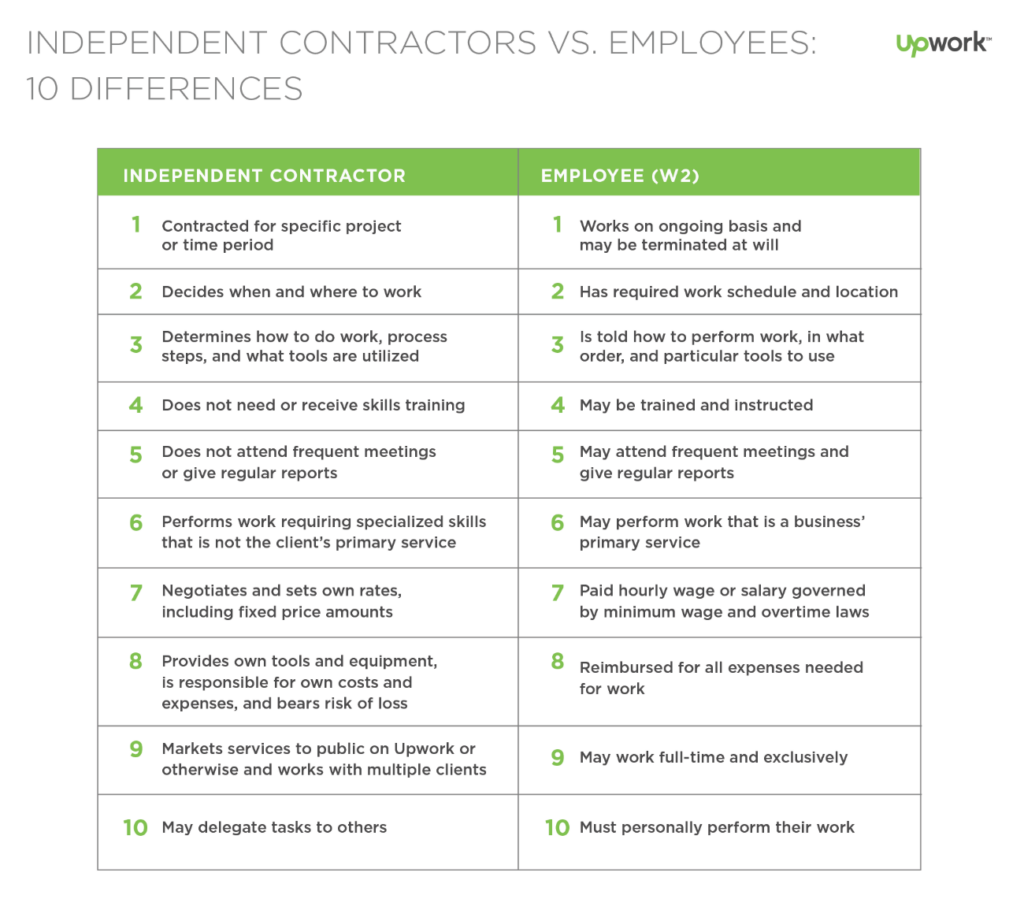
So, I include somewhere in the proposal a statement like this:
Part of working as an independent contractor means that I (the contractor) decides on the time and place of work. An independent contractor is not an employee, and the client should not expect immediate (within minutes) action to be taken at a request. For non-emergencies, expect there to be a lag of 1 business day to execution.
CONTROL. YOUR. TIME.
You may think you’re making yourself more “sell-able” by being IMMEDIATELY responsive to clients, but you really just set yourself up for headaches. if you’re expected to do that, you’re losing one of the main perks of being a freelancer – control over your time.
Freelance Social Media Contract Tip #2: Define SCOPE CREEP
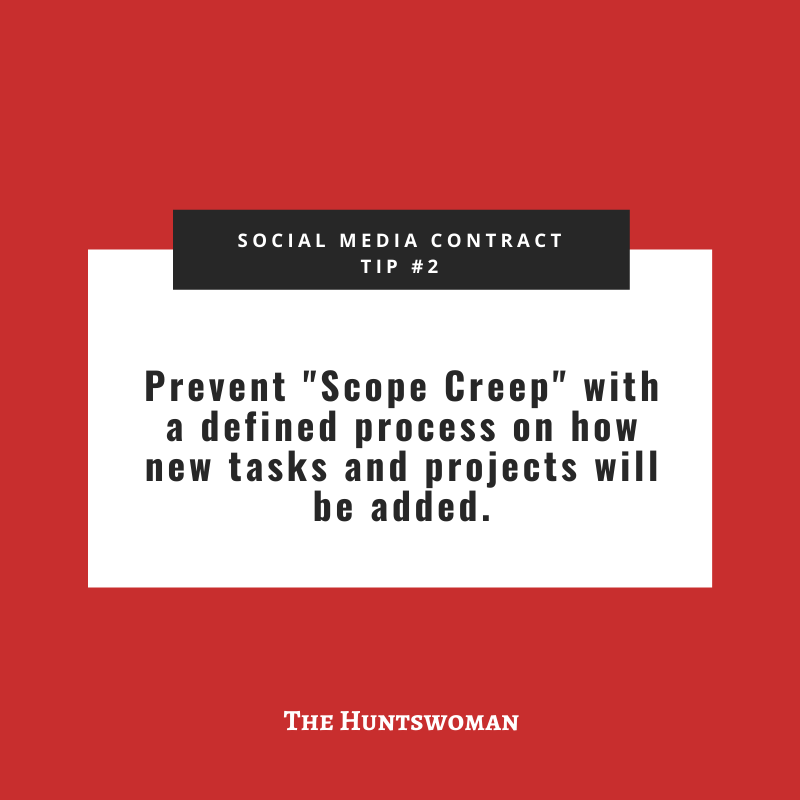
No, we’re not talking about mouth wash!
“Scope creep” is when a client starts to add tasks outside the scope of the proposal. It happens slowly, hence “creep.”
When working as a freelancer, it’s easy to pick up various tasks that your client needs – that aren’t in your original proposal. Maybe they want help with email marketing, making graphics, etc.
I have a policy that I ask this question when a client asks me to do something: Is this in the contract?
“IS THIS IN THE CONTRACT?”
Oftentimes, it’s not in the contract.
Because of this, I prepare my clients to understand the process for adding work in my proposals, with language like this:
Additional Projects & Tasks: As I work with my clients, it’s common for clients to want to add tasks and projects to contracts. To avoid scope creep, I will confirm the addition of additional tasks/projects and send an email with a definition of work and pricing. You (the client) must agree via email before work starts.
Freelance Social Media Contract Tip #3: Include a Late Fee
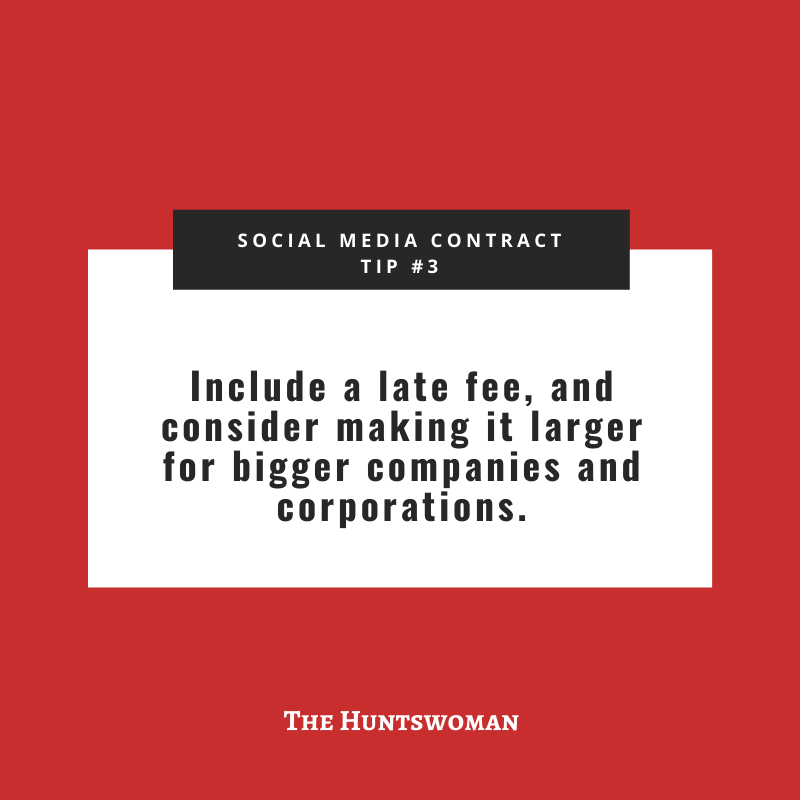
You know what motivates people? Money.
Some clients don’t understand how a late payment can really mess with a freelancer’s life. And they’re not incentivized to get their keister moving and paying your PayPal invoice with polite emails.
So, we add a late fee.
I have a late fee % of 3% of the invoice for every 10 days it’s late. For larger corporations, I charge a 15-20% late fee. If people know they’re hurting their budget by being late, they’ll get their butt over to accounts payable and demand that you get paid on time.
<< Are you learning a lot from this post? Be sure to check out my course, to level up quickly and learn from my mistakes!!>>
Freelance Social Media Contract Tip #4: Define an Approval Process
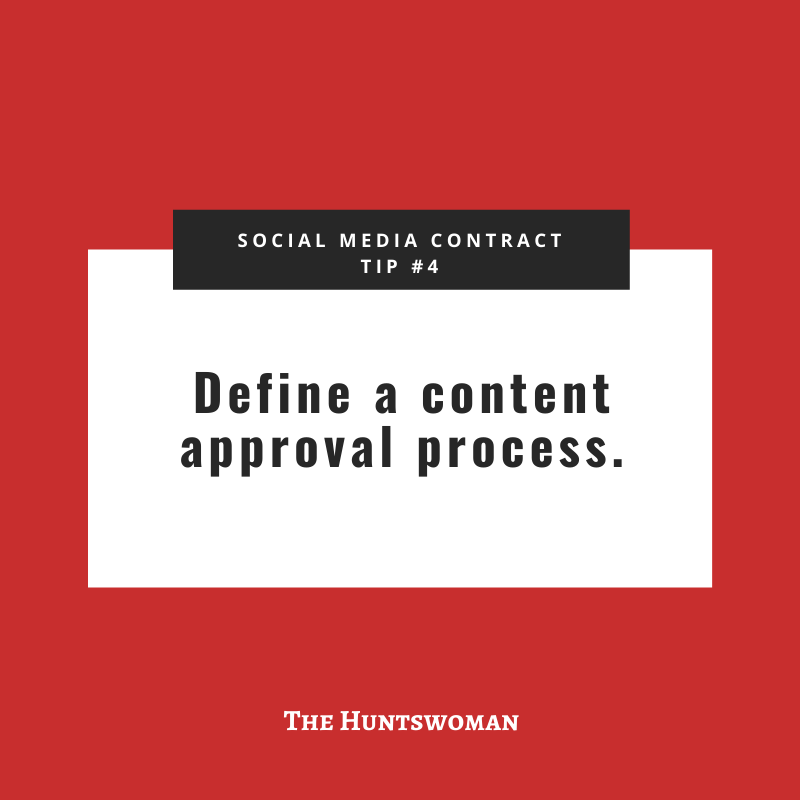
When I first begin working with a client, I have them approve everything I post. I’m learning the ins and outs of the brand, and I don’t want to post something that’s not-quite right!
Because of the need for edits and revisions, I include a timeline on when I’ll need revisions back to post. Here’s what that timeline looks like:
Day 1: Submit content calendar with post copy
Day 3: Get revisions/comments back by 12 noon
Day 4: Send revisions back by end of day
Day 5: Get final approval by end of day
Day 8: Begin posting
^^ Looking at this calendar, you’ll notice that you’re not immediately going to start posting. If I’m sending a calendar for review, it better be two weeks out!
Freelance Social Media Contract Tip #5: Allow arbitration?
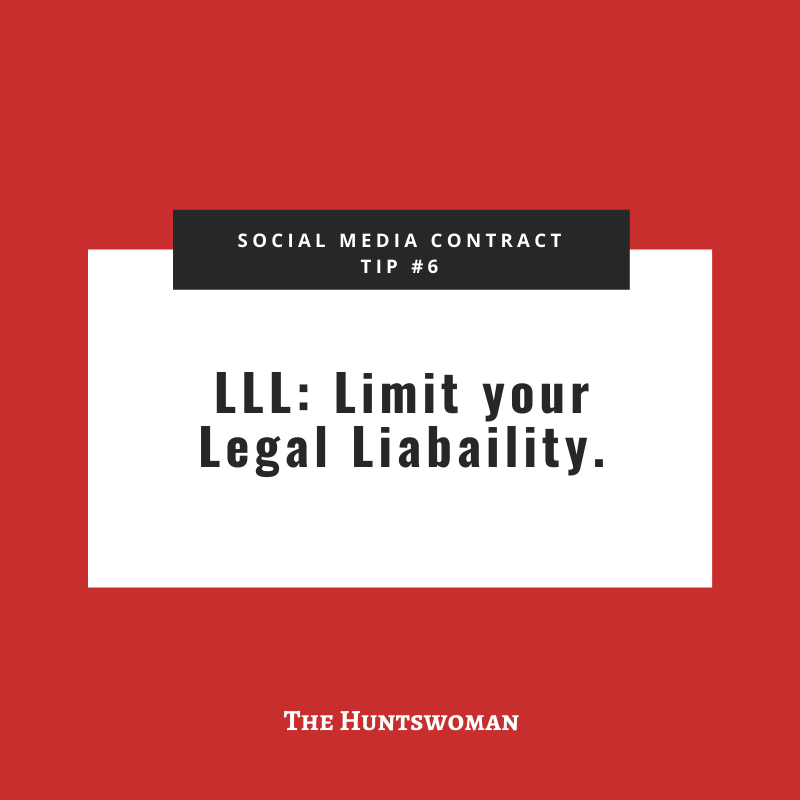
Soooo, something fun that I’ve seen crop up in contracts in the last few years much more frequently is arbitration.
Basically, arbitration changes up how you (or your client) can sue if things go south.
Definition from Legal Zoom: Arbitration is a way of resolving a dispute without filing a lawsuit and going to court. The arbitration process is similar to the proceedings in a court case: the parties may have lawyers, they exchange information, and there is a hearing where they question witnesses and present their cases. After the hearing, the arbitrator will make a decision. But arbitration is more informal than litigation and the procedures are simplified.
I recommend reading the rest of that page on Legal Zoom. I agree to arbitration-only to mitigate my risk, and sometimes I decline because I want to have recourse in court.
It’s not a deal breaker for me, but it’s important YOU understand what it is and what you’re signing.
Remote Social Media Contract Tip #6: Liability Limits
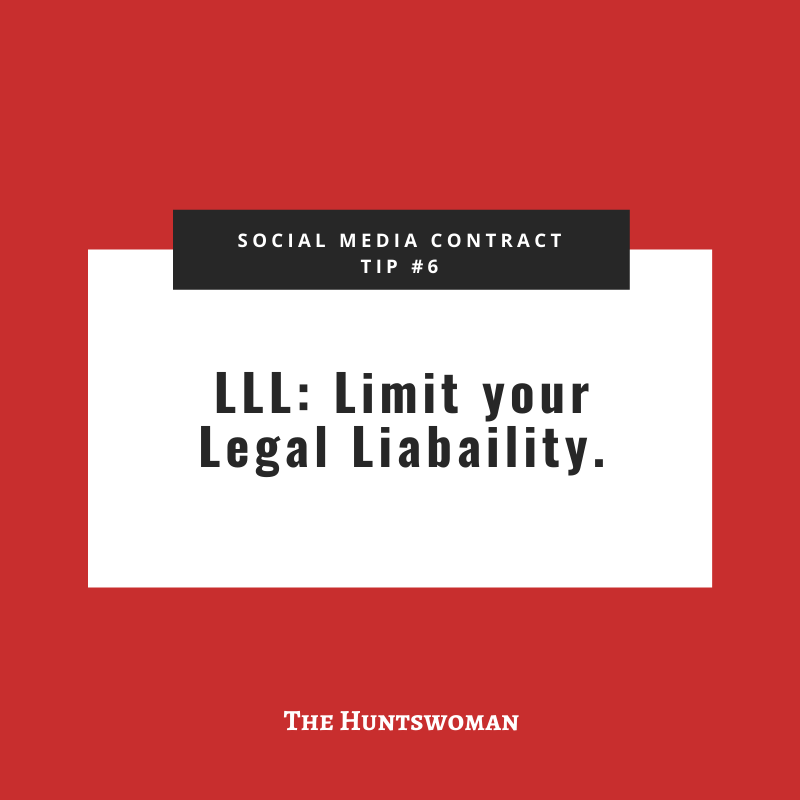
IF you’re working for a company and you’re hacked, are you liable for the data breech or loss of proprietary data?
If you mess up on a post and forget a digit on price, are you responsible for the loss of revenue?
Docular has a great section on this, or things to include:
- No liability for loss of profits
- No liability for loss of revenue
- No liability for loss of use; no liability for loss of opportunities
- No liability for loss of data or software
- No liability for consequential loss; per event liability cap upon services contract
- Aggregate liability cap upon services contract
Remote Social Media Contract Tip #7: Timeliness in Response
This circle back around to #1, but I also include in my contract (and social media proposals), how clients may contact me.
If a client is paying me less than $5,000 a month – I don’t let them text me. They can email or use Slack. Text and phone calls are reserved for clients at a higher tier. I also include language on how long it may take me to respond (1 business day).
Ready to Level Up?
Are you ready to level up in your social media marketing game? Join my class! Learn how to find and pitch clients, and learn super current strategies to make your marketing a success!












